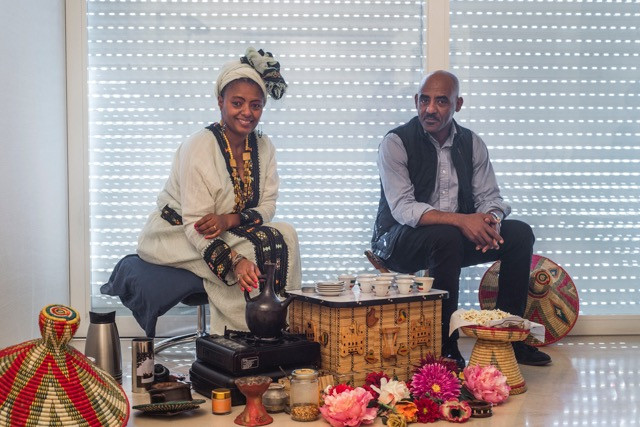A smell of incense mixed with freshly roasting coffee beans fills the room where Galila Zewdinah Milianitis is preparing for an Ethiopian coffee ceremony.
Born in Addis Ababa, educated in the United States and relatively recently arrived in the grand duchy, Galila founded the Habesha Association for Ethiopian and Eritrean refugees in Luxembourg in June 2016. With 27 members, from both countries, it is small but growing month by month.
“Habesha is about Ethiopians and Eritreans being together in harmony. It may surprise many people who will mostly remember the region’s conflicts, but we have a lot in common. Our food, our dress and even our coffee ceremony,” says Galila. The association operates a policy of no politics and no gender, faith, disability or tribal discrimination.
Whilst Ethiopians speak Amharic, and Eritreans speak Tigrigna, Galila explains that they can usually understand each other and often speak both languages.
About 85% of Ethiopians and Eritreans who arrive in Luxembourg come as refugees. Many have never heard of the country before they come. “None of our members regret coming to Luxembourg. They are welcomed, given medical attention, food, shelter and safety,” says Galila.
The Habesha Association’s foremost aim is to create “togetherness” for families and individuals, many of whom feel alone with no one to turn to if they experience problems. Most refugees, who are housed in shelters (foyers) in different parts of Luxembourg, value the monthly meetups as an opportunity to meet others outside of their foyer and to share experiences of home.
“A life in the foyer and visiting government offices can be lonely,” she says. “Refugees cannot work until they have a resident’s permit.”
Galila, fluent in French, English, Amharic and Spanish, regularly provides support as a translator in the grand duchy’s hospitals and at Olai (the Luxembourg Reception and Integration Agency). She also helps refugees to fill out necessary paperwork.
Getting the word out
“We want to help members to integrate into society smoothly,” she explains. The association meets once a month at the Clae premises in Gasperich. New members often just “turn up”, as was the case with Sam, who arrived in Luxembourg in January this year and heard about the meeting from fellow Ethiopians walking past him on the street.
The Habesha Association also wants to promote Ethiopian and Eritrean culture in Luxembourg. “Many people here know nothing about our culture and traditions,” says Galila, who has organised stands and displays at several festivals of world culture, migration and work.
The festivals give Habesha the opportunity to offer Luxembourg residents beriberi spiced meats and the chickpea dish shiro, found in the homes of rich and poor alike in Ethiopia and Eritrea. Galila uses these projects to showcase the needlework, cooking and hair braiding talents of members, with a view to creating future work opportunities for them.
“We don’t have financial support yet, but we are hoping to get some so we can buy a van, to help with the transportation needs of our members, and an office, so new arrivals have somewhere to come for help.” In the future, she also hopes to reach out to the elderly Habesha people from both countries that may be living in Luxembourg in isolation.
This article was first published in the May 2017 issue of Delano magazine. Be the first to read Delano articles on paper before they’re posted online, plus read exclusive features and interviews that only appear in the print edition, by subscribing online.
